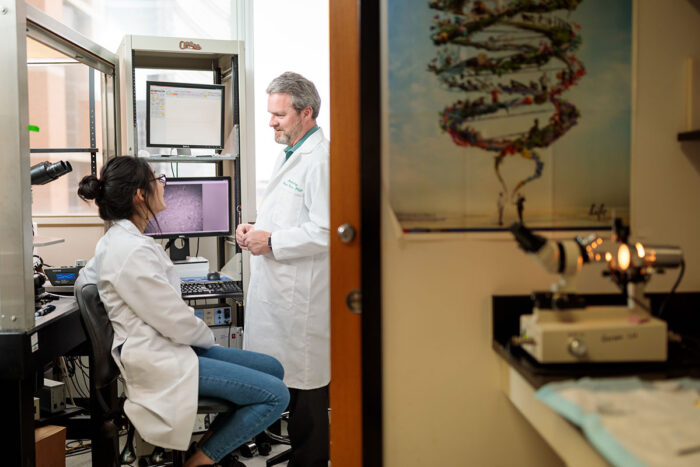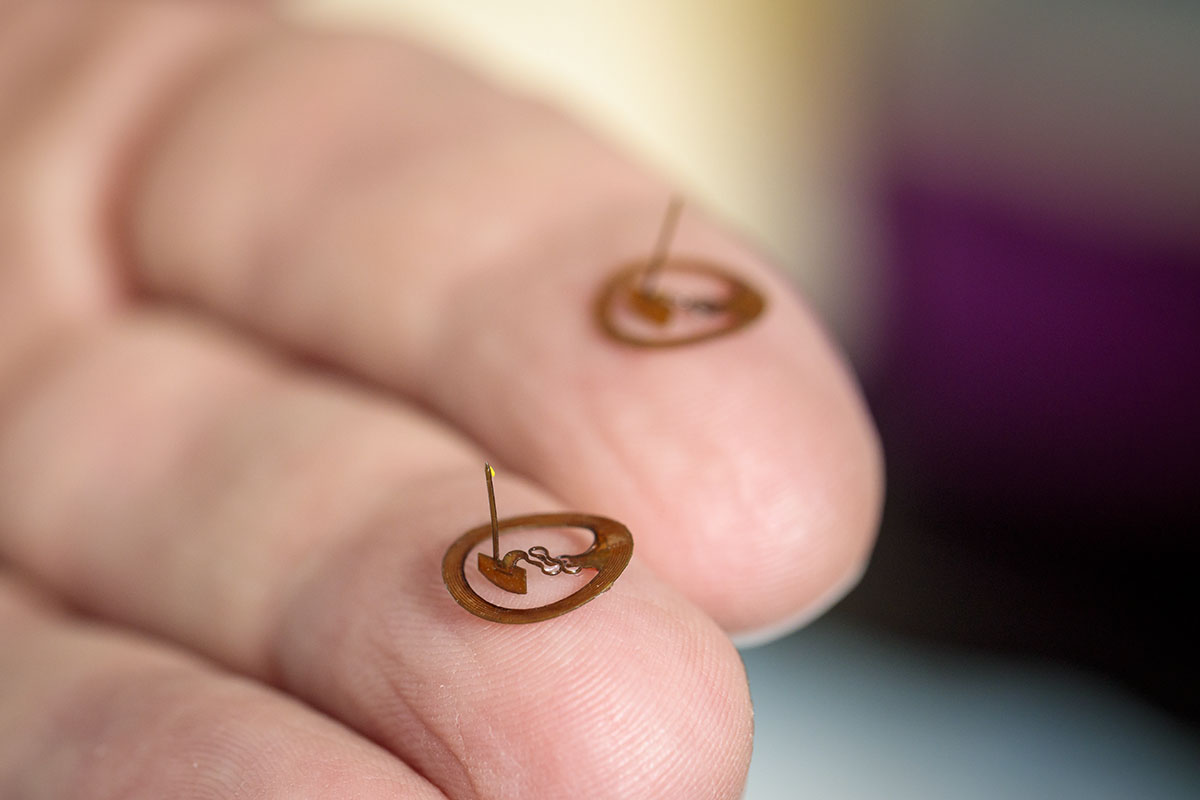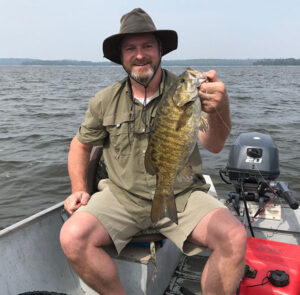Washington People: Robert Gereau
Scientist working to identify, reverse causes of chronic pain
 MATT MILLER
MATT MILLERRobert W. Gereau, PhD (right), talks in his lab with graduate student Jiwon Yi. Gereau is working to discover the genetic and molecular roots of pain, with a goal of reversing the processes that cause pain and make it so disabling.
Not too long after he started working in academic medicine, Robert W. Gereau IV, PhD — then on the faculty at Baylor College of Medicine in Houston — accepted an invitation to lecture about his work to doctors and scientists at the Washington University Pain Center.
His research and training involved cellular changes in the brain in response to experience — how people learn and adapt to the environment.
“We looked at plasticity and memory and learning, and coming from that context, I began to think of chronic pain as a way that the brain’s plasticity could become maladaptive,” Gereau recalled. “We had made what I thought were some interesting discoveries about how tissue inflammation could lead to hypersensitivity to heat. For example, when you get a sunburn, if you use warm water to wash your hands or take a shower, you tend to experience pain because your sunburned skin is very sensitive to heat.”
From that observation, Gereau’s lab began to zero in on how heat-sensitive signals are transmitted and what ion channels in cells carry those signals. He was searching for new ways to treat the problem of heat hypersensitivity by uncovering the cellular mechanisms that create the problem. Those were the findings he presented in that initial lecture at Washington University.
He remembers being surprised by the number of white coats in attendance that day. He was accustomed to addressing bench scientists at his lectures, but a number of physicians from the School of Medicine were in the room, too. One of them spoke with Gereau after the talk.
“He said something like, ‘That’s really impressive work you guys have done, but, of course, it’s meaningless for our patients,’” Gereau recalled.
“I asked what he meant, and I told him about sunburn and warm water. And he said, ‘Yeah, but that’s not really a clinical problem. You can solve it by lowering the water temperature in the shower.’”
Gereau recalls that conversation as his Eureka moment.
“I was a little hurt at first, but as I thought about having worked so hard on a problem that wasn’t really a problem, it illustrated the importance of basic scientists and clinicians talking to each other,” Gereau said. “If I was going to conduct research on pain, I needed to try to do it in ways that would help patients.”
He has come a long way since.
Treating pain with light
Not long after that lecture in 2003, Gereau was offered a faculty position in the Department of Anesthesiology. He’s been at Washington University ever since and is now the Dr. Seymour and Rose T. Brown Professor of Anesthesiology, director of the Pain Center and chief of basic research in anesthesiology. Much of his work involves helping guide basic researchers and clinicians who specialize in treating pain.
“I talked to my clinician colleagues about how it could work to have a nonclinician heading the Pain Center, and they were very receptive,” said Gereau, also a professor of neuroscience. “It works well because of the collaborative culture here, which is why I was so excited to join the faculty. Interaction between physicians and scientists is what makes Washington U unique and what makes my job so rewarding, because all of us are focused on helping patients.”
One area of Gereau’s patient-centered basic research involves the use of light to treat pain in the peripheral nerves. Working with John Rogers, PhD, at Northwestern, and Michael R. Bruchas, PhD, formerly of Washington University and now at the University of Washington, Gereau has been a key player in the development of tiny LED devices that can be implanted into various parts of the body to interrupt pain signals with light. The research team also recently completed a study in which similar devices helped correct bladder problems in laboratory animals.
 MATT MILLER
MATT MILLER“Optogenetics uses a genetic trick to make some nerve cells express light-sensitive proteins that we then activate with these tiny microLED implants,” he explained. “You also can imagine cases in which we would apply what we call optopharmacology and give the patient a drug that is inert when he or she swallows it. But if that patient has pain, say, in the knee, we could implant a device into the joint to activate light-sensitive molecules built into the drug. In theory, that could treat pain where it originates and avoid the need for drugs that affect the whole body, particularly cells in the brain.”
That work with microLED implants has led Gereau and his collaborators to found a company, NeuroLux, that one day may produce implantable devices to fight pain in new ways.
Four is enough
While Gereau and his colleagues are breaking new ground in pain treatment, he’s also breaking new ground in family life. He and his wife, Kathy, have what Gereau calls a “Brady Bunch” family. Their blended family includes their four adult children, ages 20, 21, 23 and 23. The oldest is a lab technician at the Center for Clinical Pharmacology at the School of Medicine and St. Louis College of Pharmacy.
Though Gereau was born in Kansas City, his family’s roots are in St. Louis. His great-grandfather — the first Robert Gereau — lived here. So did his grandfather, Robert Walter Gereau II, who preferred to be called Walter during his 40-plus years at Emerson Electric. It was Robert W. Gereau III who moved to the other side of the state.
 Courtesy of Robert Gereau
Courtesy of Robert GereauWith his own kids grown and gone most of the time, Gereau has discovered more time for his hobbies. He plays the French horn and trains for marathons, which he runs with his sister, Gina Gereau, who lives in Kansas City. They travel together once a year to compete in a marathon somewhere. Gereau also is an avid fisherman, a St. Louis Blues season ticket holder, and he and his wife make annual trips to wine country in California, Washington and elsewhere. They’ve also traveled to Italy and Argentina in search of fine wine.
And although his father — Robert W. Gereau III — wasn’t a scientist, Gereau is putting to use valuable skills he learned from his father.
“He was a general contractor,” Gereau said. “So another thing I like to do is make repairs to my house. At a previous house, I finished the whole basement. I’ve just remodeled the master bathroom and kitchen at our current house. But I tend to injure myself during these construction projects, so I do have an incentive to develop new therapies for pain.”







